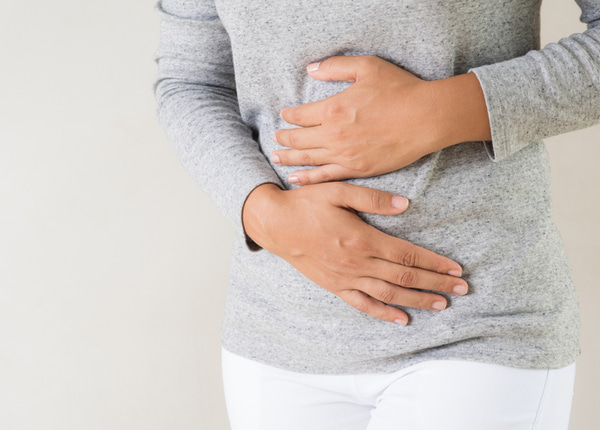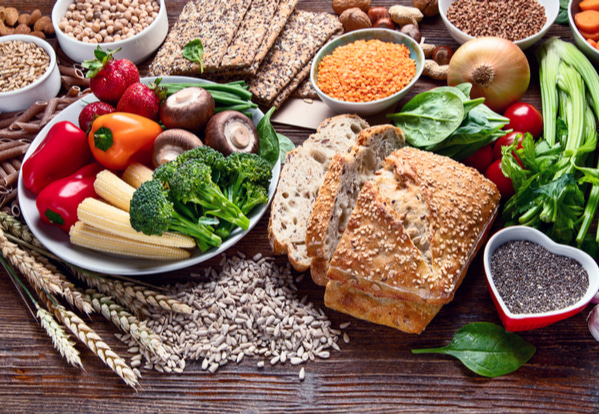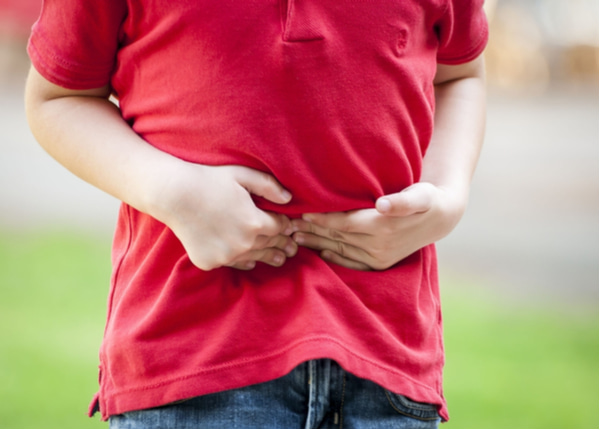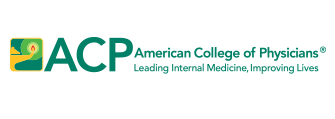BLOATING
Your pants fit when you put them on in the morning. But come later in the day, they feel uncomfortably tight. Or maybe you feel like you’re six months pregnant but you didn’t overeat. Sound familiar?
Bloating is a feeling that your tummy is going to burst. When you’re bloated, your tummy has increased abdominal pressure, usually related to gas.
It may or may not be accompanied by visible enlargement of the waist, known as abdominal distension.
This is why sometimes your tummy can feel like an inflated balloon or the size of a soccer ball.
But you don’t need to suffer in silence. Thankfully, there are ways to treat bloating so you can enjoy a healthier and happier tummy.

What causes bloating?
You might think that if you eat too much food, your tummy will get bloated fairly quickly. However, that’s not usually the case when it comes to bloating.
Bloating tends to happen when the organs of your digestive system are stretched. It can also happen when the food in your stomach moves too slowly through the digestive system.
But more commonly, bloating is caused by changes in your diet, such as eating a lot of rich food.
That’s because what you eat changes the type of bacteria you have in your gut, leading to bloating and gas.
Eating a lot of salty food and carbohydrates can make you feel bloated, as can swallowing air when you eat too fast or drink a lot of fizzy drinks.
Other health problems can also cause bloating, including:
- constipation
- coeliac disease
- food intolerance, usually to gluten, wheat or milk (lactose intolerance)
- irritable bowel syndrome (IBS)
- hormones, including before your period or during menopause
- some medicines
- gaining weight
- stress
Treating bloating
When you’re feeling bloated, all you want to do is to desperately release the pent-up gas in your belly. And sometimes you may consider drastic measures to relieve bloating.
But bloating will usually go away by itself through simply adjusting your diet.
It’s a good idea to cut down on salty foods, carbohydrates and fizzy drinks. For some people, avoiding foods that contain onion or garlic, wheat, rye, lactose products or stone fruit may also help treat bloating.
If your bloating is caused by constipation, you can eat more high-fibre foods, increase the amount of water that you drink and exercise regularly.
However, if you have a medical condition such as coeliac disease or irritable bowel syndrome (IBS), you’ll need to follow a strict diet to prevent bloating.
If you have IBS, studies have shown that following the low FODMAP diet can help. This involves cutting out some dairy products, wheat and other grains, as well as some certain fruits and vegetables.
It’s important to talk to a health professional such as your doctor or dietitian before starting the low FODMAP diet to make sure it is right for you.

How to prevent bloating
Nobody wants to feel bloated. It’s uncomfortable and embarrassing. But with a healthy diet and regular exercise, bloating doesn’t need to get in the way of your happiness and health.
To help prevent bloating, it’s important to follow a balanced and healthy diet. Eat at least 25g of fibre (30g for adult males) every day. Cut down on processed and fatty foods and drink less alcohol.
Overeating may also cause bloating.
Try to eat your food in portions and eat more slowly. Eating regularly can help prevent digestive problems.
Another great way to strengthen your gut is regular exercise. Exercise strengthens the muscles in your tummy and stimulates the digestive system to push food through. Regular exercise helps with stress, which affects the nerves in the digestive system and can slow down digestion.
When to seek help for bloating
Bloating rarely signifies that something more serious is wrong. If your bloating doesn’t improve from following the advice shown above, see your doctor.
However, you should seek medical attention if you have bloating as well as:
- diarrhoea
- persistent or severe abdominal pain
- blood in your stools (poo)
- changes in the colour or frequency of your stools
- weight loss without your trying to lose weight
- loss of appetite or feeling full quickly.

What you can do as a parent
You know what bloating is like for your own belly, but what about for your children? If your child has flatulence, or wind, they might sometimes have stomach pain alongside their bloating. This can happen when the gas builds up in their intestines and they can’t get rid of it – for example, if they have diarrhoea or constipation.
As parents, any signs of discomfort in your children can cause us to worry. But bloating is usually not a cause for deep concern. Your child doesn’t usually need treatment for flatulence.
But if you notice there are certain foods that seem to give your child a lot of flatulence, you could try to cut back on them in their diet. These foods might include:
- beans
- onions
- cabbage
- peas
- broccoli
- legumes
- fizzy drinks
- artificial sweeteners
- chewing gum.
It’s a good idea to talk to your doctor or a dietitian if you’re thinking about making big changes to your child’s diet.
Food intolerance
Bloating could also mean your child is reacting to the food they are eating. It might be because your child’s body can’t properly break down the food. Or it might be because your child’s body is irritated by a chemical that’s found in the food.
Thankfully, you don’t need to stress.
Elimination diets are the most common test for food intolerance. This involves adjusting your child’s diet to remove the foods that might cause intolerance. You remove the food for a period of time, usually weeks. Then you reintroduce foods one at a time to work out which food is causing the intolerance.
For suspected fructose or lactose intolerance, doctors might also use a breath test.
If you have any concerns about your child’s food intolerance, talk to your doctor or a dietitian. You can also visit our Infant and Baby section for more information.
Are you ready to improve your gut symptoms?
We’ve all had that uncomfortable ‘full belly’ feeling at some point. At Gut Dr, we believe bloating shouldn’t get in the way of a happy and healthy life. We want to help you get to the bottom of your bloating issues, as well as help you understand your gut.
Leading gastroenterologist Dr Vincent Ho takes a deep dive into the exploding medical field of gut health and highlights small steps that go a long way in fortifying your tummy health. With decades of experience and research, Gut Dr can help you enjoy a happier and healthier gut.
For more information on bloating and gut health, subscribe to our newsletter. Or check out Dr Vincent Ho’s latest book ‘The Healthy Baby Gut Guide‘ for practical and easy-to-follow advice for parents on looking after your baby’s gut health.
Have a suggestion?
Get in touch to submit a question for a feature article.




